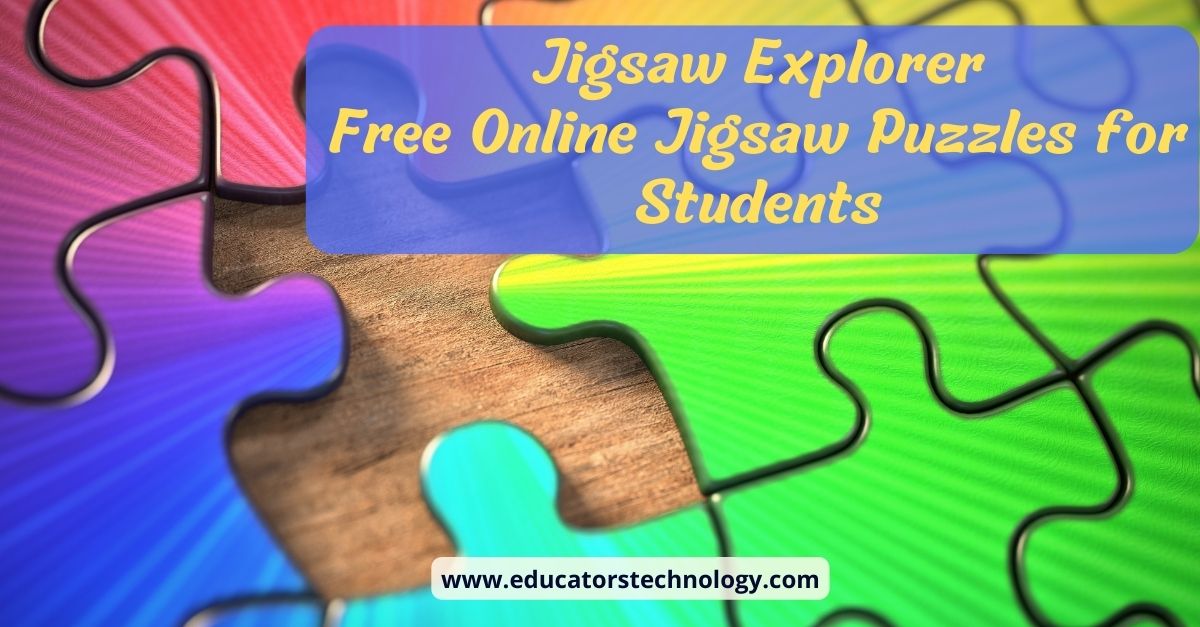
Educational TechnologyNews
Jigsaw Explorer- Free Online Jigsaw Puzzles for Students
Author: By Med Kharbach, PhD
Source
Jigsaw Explorer is a website that offers a wide variety of online jigsaw puzzles that you can use with kids and students in and out of class. Jigsaw Explorer also allows you to create your own puzzles based on your photos and you can share these puzzles with others via email or through social media websites.
Jigsaw Explorer offers various features that make it an interesting game-based learning platform to use in your instruction. Some of these features include : full screen display, numerous puzzle pieces to choose from, play progress is automatically saved and you can always return to complete unfinished puzzles (provided you don’t delete the cookies in your browser), the ability to show only the edge pieces, easily move different pieces using capture and release feature, rotatable puzzle pieces, multiplayer mode to collaborate on puzzles with others, and many more.
Multiplayer Jigsaw Puzzle Games
Jigsaw Explorer includes multiplayer mode that allows players to collaborate with each other on the same jigsaw puzzle. Each player can view the moves of the other on their own screen. The way multiplayer game works is simple: select a jigsaw puzzle, click on the multiplayer button , type in a nickname and click on ‘Create Game Link’.
Copy the generated game link and share it with others. Jigsaw Explorer allows you to invite up to 20 people to join the game. Each time a player joins the game you will be notified within the game. Players who join the game late will be able to see the progress already made on the game and can start right away.
Jigsaw Explorer Puzzle Categories
Puzzles in Jigsaw Explorer are arranged into various categories including Amusement, Mystery, Animals (e.g., birds, cats, cows, dogs, fish, horses, insects, etc), Nature (e.g., beaches, farms, lakes, landscapes, flowers, seasons, sunsets, waterfalls, etc), Art (e.g., costumes, illustrations, mural, paintings, sculpture, street art, etc), People, Space, Composition (e.g., collages, collections, writing, still life, etc), Events, Structures (e.g., barns, bridges, buildings, castles, churches, mills, lighthouses, etc), Holidays (e.g., Christmas, Halloween, Thanksgiving, New Year’s Day), Transportation (e.g., Airplanes, cars, ships, trains, trucks, etc), and more.
Friday Mystery Puzzles
Each Friday, Jigsaw Explorer features a unique set of puzzles called Friday Mystery Puzzles. In this type of puzzles, a box with a cover image is displayed showing part of what the completed puzzle will look like once all parts are put together. ‘The added challenge, and the fun of discovering what the completed image looks like, has made the Friday mystery puzzles among the most popular puzzles at Jigsaw Explorer.’
The benefits of jigsaw in education
Jigsaw puzzles can be used in class to create meaningful learning experiences. More specifically, you can use them in content-based activities to help students, for instance, learn about different geographical areas or cultures and discover what makes each culture unique, explore the solar system and learn about outer space, learn about animals and nature and many more. To learn more about the educational power of jigsaw puzzles, check out Lucie Renard post titled ‘How to use jigsaw puzzles to spice up your lessons’
Besides imbuing the classroom with a fun and vivacious atmosphere that is conducive to engaging learning experiences, Jigsaw puzzles also enable students to develop a number of higher order thinking skills including logical thinking, analytic thinking, critical thinking, strategic planning, problem-solving, and many more. At the sensory motor level, jigsaw puzzles help develop hand-eye combination allowing learners to engage their psychosomatic abilities to create holistic learning experiences.
Jigsaw puzzles also embrace various learning styles and speak to the learning needs of students from various skill and age groups. Kinaesthetic and visual learners will especially enjoy these games. However, regardless of the inherent features of these games, jigsaw puzzles can only acquire an educational value to the extent that we, teachers and educators, use them intentionally to boost students learning and enhance their comprehension. As Barbara White noted, “Don’t just give your child a present of a jigsaw puzzle-instead give your child an educational experience and a memory that will last a lifetime.”

